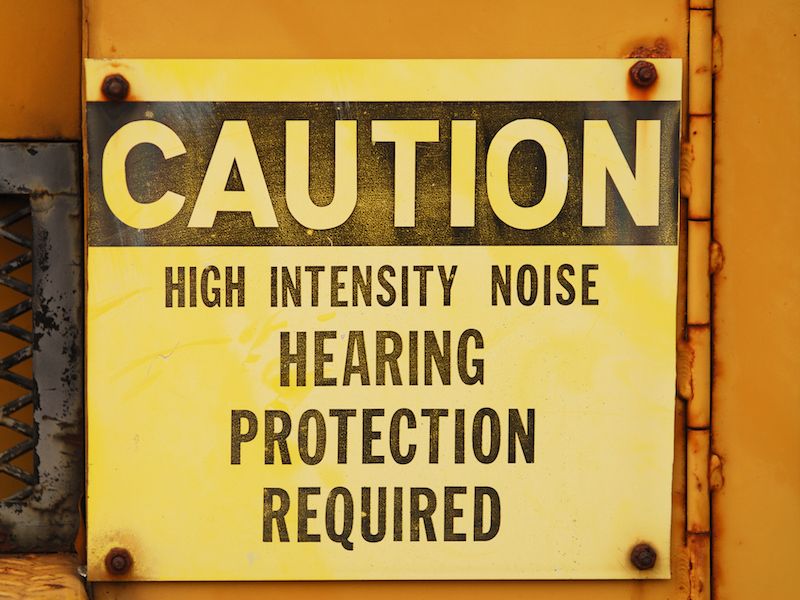
Understanding you should safeguard your hearing is one thing. Knowing when to protect your ears is another matter. It’s more challenging than, let’s say, knowing when you need sunscreen. (Is it sunny and will you be outside? Then you need sunblock.) It’s not even as simple as determining when to wear eye protection (Working with hazardous chemicals? Doing some building? You need eye protection).
When dealing with when to wear hearing protection, there seems to be a large grey area which can be dangerous. Unless we have particular information that some activity or place is hazardous we tend to take the easy path which is to avoid the issue entirely.
Risk Assessments
In general, we’re not very good at assessing risk, especially when it comes to something as intangible as damage to the ears or the probability of permanent sensorineural hearing loss. Let’s take some examples to prove the point:
- A very loud rock concert is attended by person A. The concert lasts around 3 hours.
- A landscaping business is run by person B. She spends a considerable amount of time mowing lawns, then she goes home to a quiet house and reads.
- Person C works in an office.
You may think the hearing hazard is higher for person A (let’s just call her Ann). For the majority of the next day, her ears will still be screeching from the loud performance. It seems rational to assume that Ann’s recreation was very risky.
The noise that person B (let’s just call her Betty), is exposed to is not as loud. Her ears don’t ring. So her ears must be safer, right? Not really. Because Betty is mowing all day. Actually, the damage builds up a little bit at a time although they don’t ring out. Even moderate noise, if experienced with enough frequency, can harm your ears.
What’s occurring with person C (let’s call her Chris) is even tougher to sort out. Lawnmowers have instructions that emphasize the risks of persistent exposure to noise. But even though Chris works in a quiet office, she has a very noisy, hour-long commute each day through the city. In addition, she sits at her desk and listens to music through earbuds. Does she need to consider protection?
When is it Time to Worry About Protecting Your Hearing?
Generally speaking, you need to turn the volume down if you have to raise your voice to be heard. And if your surroundings are that noisy, you really should consider using earplugs or earmuffs.
The limit should be 85dB if you want to be clinical. Sounds above 85dB have the ability, over time, to lead to damage, so you need to consider wearing ear protection in those circumstances.
Your ears don’t have a built-in sound level meter to alert you when you get to that 85dB level, so countless hearing professionals recommend downloading special apps for your phone. You will be able to take the correct steps to protect your hearing because these apps will tell you when the sound is approaching a harmful volume.
A Few Examples
Your phone may not be with you wherever you go even if you do download the app. So we may formulate a good standard with a few examples of when to protect our ears. Here we go:
- Working With Power Tools: You know that working all day at your factory job will require hearing protection. But how about the enthusiast building in his garage? Even if it’s only a hobby, hearing specialists suggest using hearing protection if you’re operating power equipment.
- Listening to music with earbuds. This one calls for caution, more than protection. Whether your music is playing directly into your ears, how loud it is playing, and how long you’re listening to it are all things you should pay attention to. Consider getting headphones that cancel out outside noise so you don’t need to turn up the volume to dangerous levels.
- Exercise: You know your morning cycling class? Or maybe your evening Pilates session? You might think about using hearing protection to each one. The high volume from instructors who play loud music and microphones for motivation, though it may be good for your heart rate, can be bad for your ears.
- Driving & Commuting: Do you drive for Lyft or Uber? Or perhaps you’re just hanging out downtown for work or boarding the train. The constant noise of city living, when experienced for 6-8 hours every day, can cause damage to your ears over the long haul, specifically if you’re turning up your music to hear it over the commotion.
- Household Chores: We already mentioned how something as basic as mowing the lawn, when done frequently, can necessitate hearing protection. Chores, such as mowing, are most likely something you don’t even think about, but they can cause hearing impairment.
These illustrations may give you a good baseline. When in doubt, though, you should defer to protection. Compared to leaving your ears exposed to future damage, in most instances, it’s better to protect your hearing. Protect today, hear tomorrow.